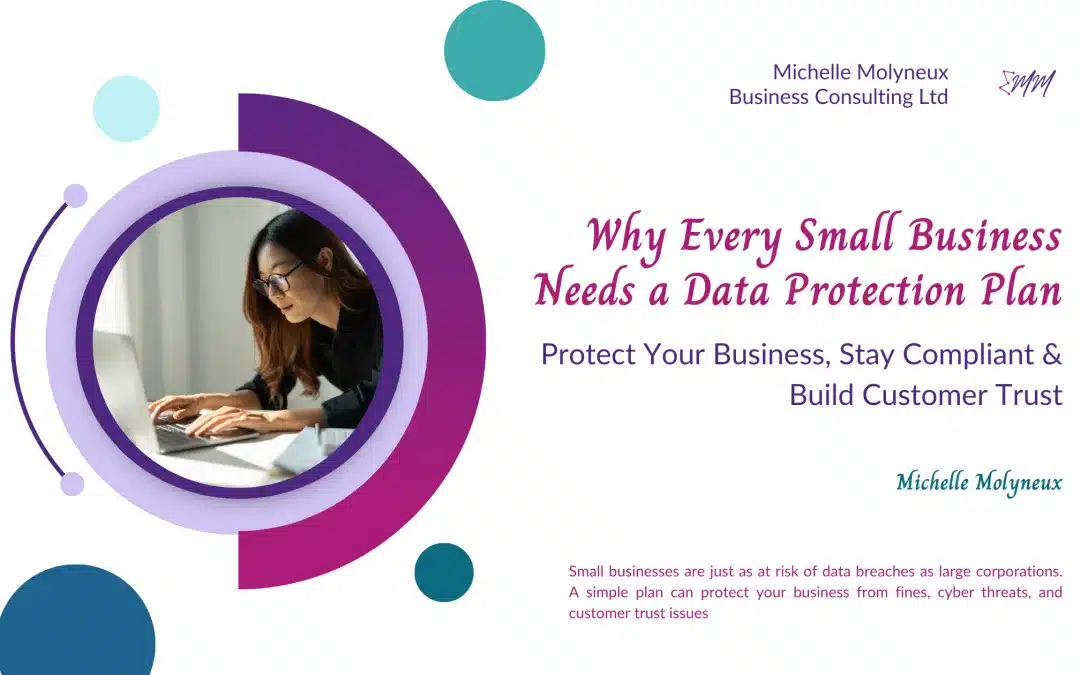Protect Your Business, Stay Compliant & Build Customer Trust
Let’s be real—data protection isn’t the most exciting part of running a business. But whether you’re a one-person operation or a growing team, handling customer details, payment information, or even email lists means you have a legal and ethical responsibility to protect that data.
And here’s the thing: small businesses are just as vulnerable to data breaches and fines as big companies. Cybercriminals target smaller businesses more often because they tend to have weaker security. But don’t worry—we’re here to make it simple.
In this blog, we’ll break down:
✅ Why data protection matters (even for micro-businesses!)
✅ What happens if you don’t have a data protection plan
✅ How to create one without getting overwhelmed
Ready? Let’s dive in.
1. Why Data Protection Matters for Small Businesses
You might think data protection laws like GDPR only apply to big corporations. But if you collect, store, or process personal data in any way (think customer names, emails, or payment details), then you must comply.
Still not convinced? Here’s why you should care:
🔹 Fines & Legal Risks – The ICO (Information Commissioner’s Office) can issue fines of up to £17.5 million or 4% of your turnover for serious breaches.
🔹 Lost Customer Trust – A study by Cisco found that 80% of customers will take their business elsewhere after a data breach.
🔹 Reputation Damage – Even a small mistake (like emailing the wrong person) can cause a PR nightmare.
🔹 Cybercrime is on the Rise – In 2023 alone, half of all UK small businesses reported experiencing a cyber attack.
💡 Real-World Example: Imagine a small online retailer loses customer data because they used weak passwords. Customers hear about the breach, stop shopping with them, and the business struggles to recover. A simple data protection plan could have prevented this.
2. What Happens if You Ignore Data Protection?
It’s tempting to think, “I don’t have time for this—I’ll deal with it later.” But ignoring data protection can cost you big time.
Here are some common risks businesses face when they don’t have a data protection plan:
❌ You Could Get Fined
Even small businesses can be fined for GDPR breaches. The ICO has penalised businesses for sending marketing emails without consent or failing to secure customer data.
💡 Example: A small recruitment company in the UK was fined £40,000 for sending marketing emails without consent.
❌ You Might Lose Customers
If customers don’t trust you with their data, they’ll go elsewhere.
💡 Example: A local gym accidentally emailed members’ personal details to the wrong mailing list. The result? Massive complaints, bad press, and lost memberships.
❌ Cyber Attacks Could Ruin Your Business
Hackers often target small businesses because they assume their security is weak. Without proper protection, your customer data (and business reputation) is at risk.
3. How to Create a Data Protection Plan (Without the Overwhelm!)
Good news—you don’t need a law degree to get data protection right! Here’s a simple step-by-step guide to get you started:
📌 Step 1: Identify What Data You Collect
- Do you collect customer names, emails, or payment details?
- Where do you store this data? (Emails, spreadsheets, cloud storage?)
- Who has access to it?
💡 Tip: If you’re using third-party tools (like Mailchimp, Google Drive, or Shopify), make sure they’re GDPR-compliant.
📌 Step 2: Secure Your Data
- Use strong passwords and two-factor authentication (2FA)
- Encrypt sensitive files and use secure cloud storage
- Regularly update software to prevent cyber threats
💡 Tip: Consider using a password manager to store credentials securely.
📌 Step 3: Get Your Legal Bits in Place
✅ Add a Privacy Policy to your website
✅ Make sure you have clear opt-ins for email marketing
✅ Set up a Data Retention Policy so you don’t store unnecessary data
💡 Tip: Not sure what should be in your Privacy Policy? We can help!
📌 Step 4: Prepare for ‘Uh-Oh’ Moments
- What will you do if a data incident happens?
- Who do you need to notify? (ICO, customers, suppliers?)
- Keep a data incident response checklist so you can act fast
💡 Example: If you accidentally email sensitive info to the wrong person, acting quickly and reporting it properly can prevent fines and legal trouble.
4. FAQs About Data Protection for Small Businesses
💬 Do I need a data protection plan as a freelancer or a one-person business?
Yes! If you handle personal data (even just emails), GDPR applies to you.
💬 What’s the easiest way to stay GDPR-compliant?
Start with the basics: secure your data, establish the right policies, and collect only the information you actually need.
💬 How do I know if my website is GDPR-compliant?
You need:
- A clear Privacy Policy
- Cookie consent (not just a banner!)
- A way for users to opt-in to marketing emails
💬 What should I do if I’ve never considered data protection?
Don’t panic! Review your data and where it’s stored, then work from there.
Final Thoughts: Start Small, Stay Safe
Data protection doesn’t have to be complicated or scary. Taking a few simple steps now can save your business from big problems later.
Not sure where to start? That’s where we come in! We help small businesses like yours make sense of GDPR without the legal jargon or overwhelm.
📩 Need help? Book a free call now!

